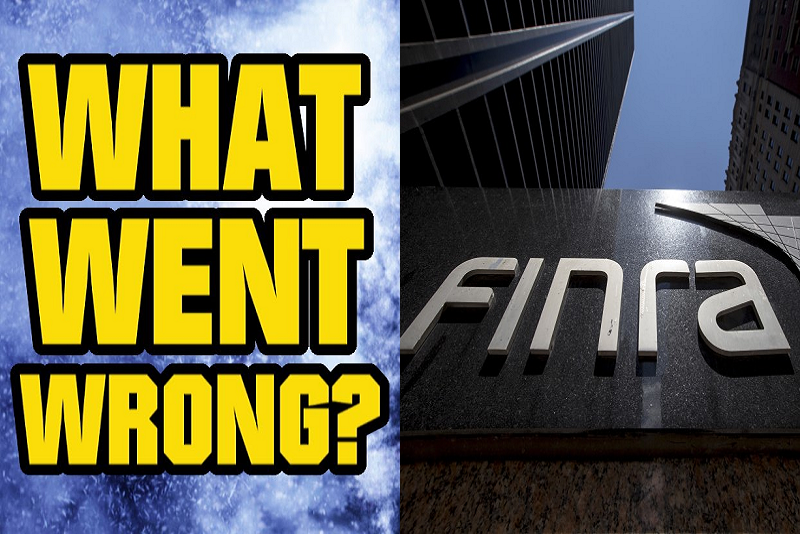BROWSE BY TOPIC
- Bad Brokers
- Compliance Concepts
- Investor Protection
- Investments - Unsuitable
- Investments - Strategies
- Investments - Private
- Features/Scandals
- Companies
- Technology/Internet
- Rules & Regulations
- Crimes
- Investments
- Bad Advisors
- Boiler Rooms
- Hirings/Transitions
- Terminations/Cost Cutting
- Regulators
- Wall Street News
- General News
- Donald Trump & Co.
- Lawsuits/Arbitrations
- Regulatory Sanctions
- Big Banks
- People
TRENDING TAGS
Stories of Interest
- Sarah ten Siethoff is New Associate Director of SEC Investment Management Rulemaking Office
- Catherine Keating Appointed CEO of BNY Mellon Wealth Management
- Credit Suisse to Pay $47Mn to Resolve DOJ Asia Probe
- SEC Chair Clayton Goes 'Hat in Hand' Before Congress on 2019 Budget Request
- SEC's Opening Remarks to the Elder Justice Coordinating Council
- Massachusetts Jury Convicts CA Attorney of Securities Fraud
- Deutsche Bank Says 3 Senior Investment Bankers to Leave Firm
- World’s Biggest Hedge Fund Reportedly ‘Bearish On Financial Assets’
- SEC Fines Constant Contact, Popular Email Marketer, for Overstating Subscriber Numbers
- SocGen Agrees to Pay $1.3 Billion to End Libya, Libor Probes
- Cryptocurrency Exchange Bitfinex Briefly Halts Trading After Cyber Attack
- SEC Names Valerie Szczepanik Senior Advisor for Digital Assets and Innovation
- SEC Modernizes Delivery of Fund Reports, Seeks Public Feedback on Improving Fund Disclosure
- NYSE Says SEC Plan to Limit Exchange Rebates Would Hurt Investors
- Deutsche Bank faces another challenge with Fed stress test
- Former JPMorgan Broker Files racial discrimination suit against company
- $3.3Mn Winning Bid for Lunch with Warren Buffett
- Julie Erhardt is SEC's New Acting Chief Risk Officer
- Chyhe Becker is SEC's New Acting Chief Economist, Acting Director of Economic and Risk Analysis Division
- Getting a Handle on Virtual Currencies - FINRA
ABOUT FINANCIALISH
We seek to provide information, insights and direction that may enable the Financial Community to effectively and efficiently operate in a regulatory risk-free environment by curating content from all over the web.
Stay Informed with the latest fanancialish news.
SUBSCRIBE FOR
NEWSLETTERS & ALERTS
This Broker Played a Volatility Game He Didn’t Understand
by Howard Haykin
James Flower agreed to serve a 3-month suspension and to complete 10 hours of continuing education on complex products to settle FINRA charges that he recommended that 13 of his customers invest in a highly volatile exchange-traded note without having a reasonable basis for recommending the transactions. No monetary sanctions were imposed in light of Flower’s financial status.
BACKGROUND. Flower, a resident of Melville, NY, has been in the industry 19 years with 17 firms. From 2010 to 2014 he was associated with Global Arena Capital, a former FINRA member firm, serving as a General Securities Representative. Flower currently is registered with another FINRA member firm. Flower had no disciplinary history.
FINRA FINDINGS. During 2013 and 2014, Flower recommended that 13 of his customers INVEST in a security known as the iPath S&P 500 VIX Short Term Futures ETN ("VXX"), a highly volatile exchange-traded note (“ETN”), without having a reasonable basis for recommending the transactions.
Flower believed (incorrectly) that the ETN traded inverse to the S&P 500 index, and so he recommended that customers PURCHASE AND HOLD the ETN as a hedge to an anticipated overall market decline. However, in doing so, Flower’s 13 customers suffered losses in excess of $249,000 after holding their shares for periods ranging from 2 weeks to over 1 year. Flower lacked a sufficient understanding of the mechanics of the exchange-traded note to form a reasonable basis upon which to recommend the purchase of it to his customers.
The VXX Exchange-Traded Note. The VXX is an ETN that offers investors exposure to the returns of one- and two-month futures contracts on the CBOE Volatility Index (the "VIX Index"). The VIX Index is designed to measure the market's expectations of volatility in large cap U.S. stocks over the next 30-day period. Although the VXX moves in the opposite direction of the index it tracks, it has its own independent risks.
Most significantly, it is generally expected to lose value as time moves on, and thus it is rarely if ever considered to be a prudent long-term investment. The value of futures contracts on the VIX Index generally decreases over time. As a result, the VXX is rarely if ever suitable as a long-term investment, but instead is generally held for brief periods measured in days for short-term speculation or to hedge a portfolio against a market downturn, rather than months or even weeks.
FINANCIALISH TAKE AWAY. The VIX Index is often referred to as the “investor fear gauge” and, as FINRA correctly notes, it’s best suited as a short-term trading vehicle - not as an ‘investment’. FINRA is also correct in noting that VXX has its own risks – so it may not necessarily move in the opposite direction of the index it tracks.
That said, it would have been instructive for FINRA to have provided some context. For example, what was the scope of the customers’ losses as a percentage to their overall holdings? [FINRA so often refers to percentages – why not now?] Or, what was the direction of the market during the “Relevant Period?”
- If we presume that the collective portfolio valuation of Mr. Flower's 13 customers was in excess of $8 million, then the $249,000 in losses would amount to ~3% of their holdings - not draconian for a hedged bet. Unfortunately, this information is not available – though, admittedly, it would not have pardoned Mr. Flower's errors.
- During the period, the stock market was bullish, with the S&P 500 Index running up from $1,426 (on 1/2/13) to $1,872 (on 3/31/14). That means that Mr. Flower's bearish bet was a loser.
This case was reported in FINRA Disciplinary Actions for August 2017.
For details on this case, go to ... FINRA Disciplinary Actions Online, and refer to Case #2014040644001.





